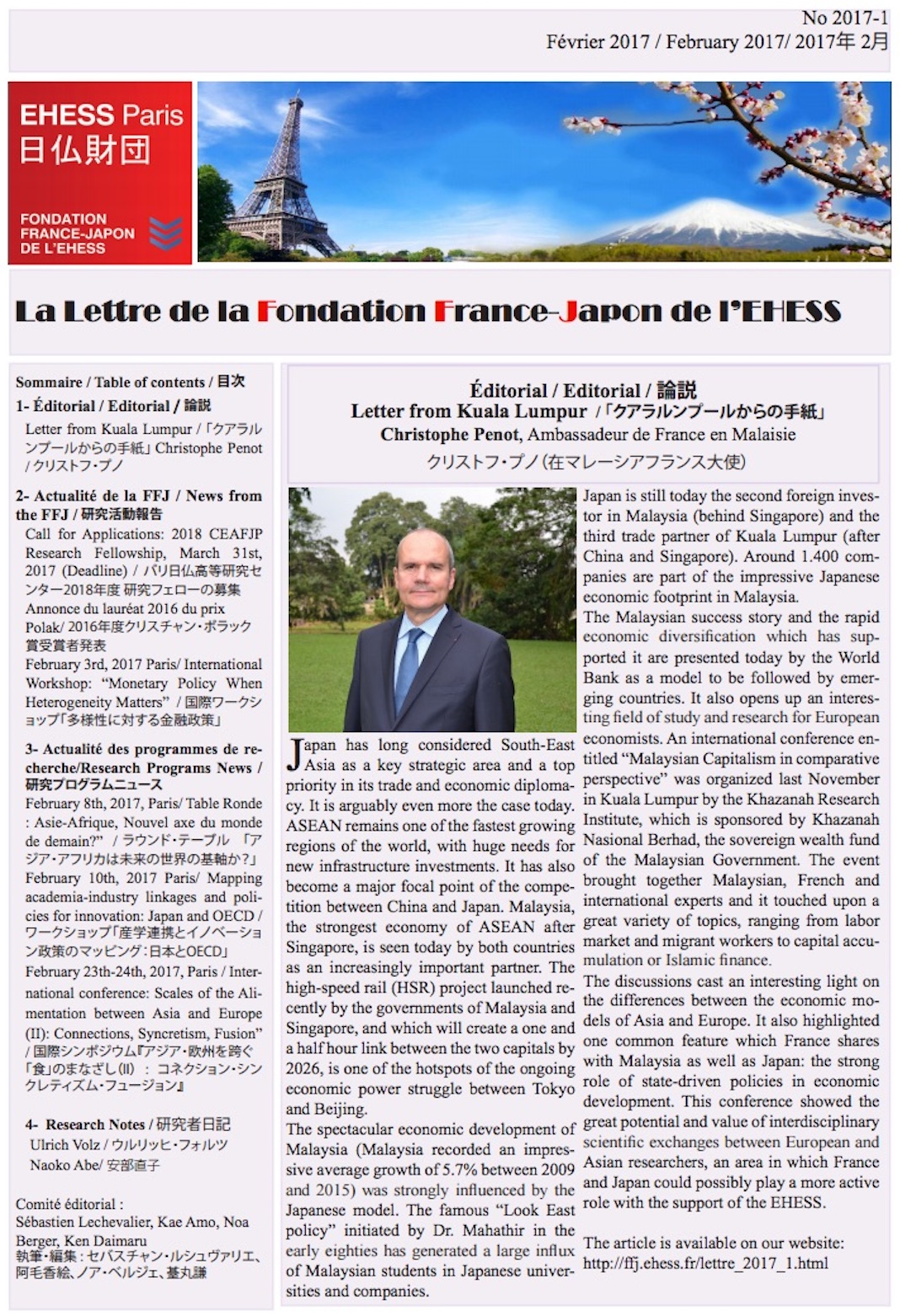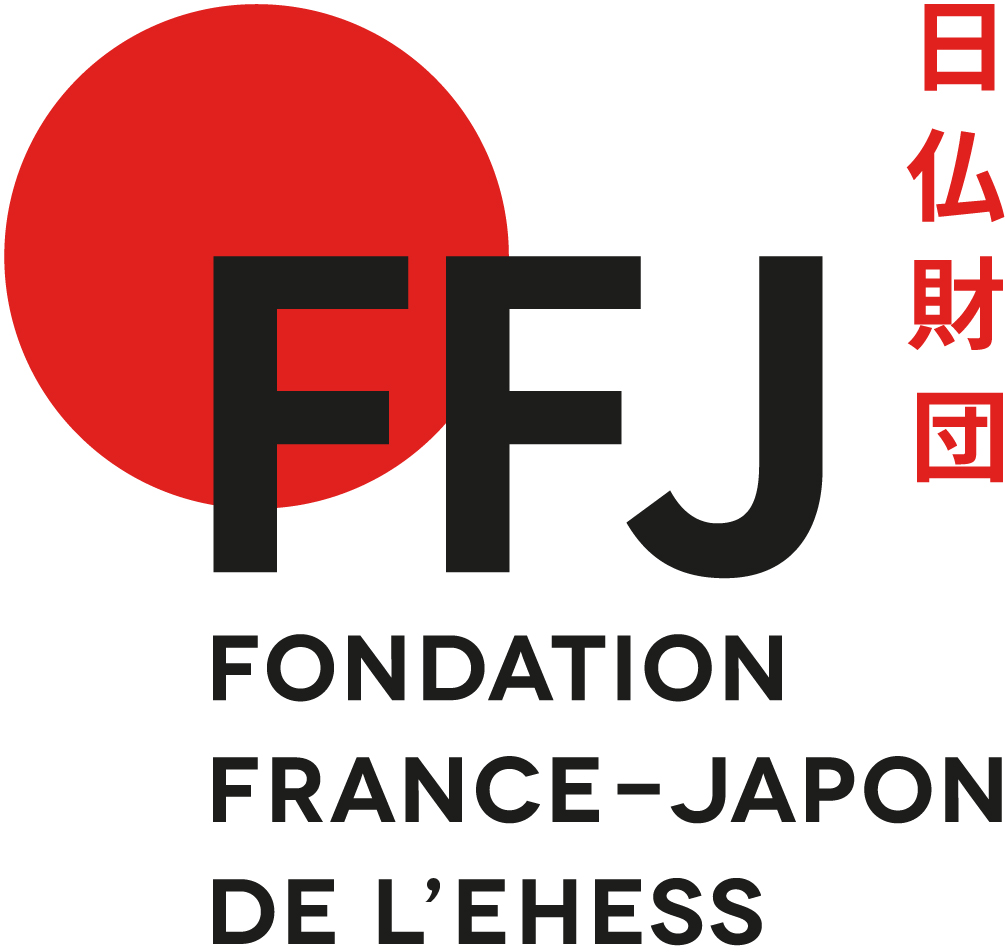LA LETTRE DE LA FONDATION FRANCE-JAPON DE L'EHESS
No 2017-01
Février 2017
No 2017-01
Février 2017
 |
1- Éditorial
Letter from Kuala Lumpur
Chrisophe Penot, Ambassadeur de France en Malaisie
Chrisophe Penot, Ambassadeur de France en Malaisie
Japan has long considered South-East Asia as a key strategic area and a top priority in its trade and economic diplomacy. It is arguably even more the case today. ASEAN remains one of the fastest growing regions of the world, with huge needs for new infrastructure investments. It has also become a major focal point of the competition between China and Japan. Malaysia, the strongest economy of ASEAN after Singapore, is seen today by both countries as an increasingly important partner. The high-speed rail (HSR) project launched recently by the governments of Malaysia and Singapore, and which will create a one and a half hour link between the two capitals by 2026, is one of the hotspots of the ongoing economic power struggle between Tokyo and Beijing.
The spectacular economic development of Malaysia (Malaysia recorded an impressive average growth of 5.7% between 2009 and 2015) was strongly influenced by the Japanese model. The famous “Look East policy” initiated by Dr. Mahathir in the early eighties has generated a large influx of Malaysian students in Japanese universities and companies. Japan is still today the second foreign investor in Malaysia (behind Singapore) and the third trade partner of Kuala Lumpur (after China and Singapore). Around 1.400 companies are part of the impressive Japanese economic footprint in Malaysia.
The Malaysian success story and the rapid economic diversification which has supported it are presented today by the World Bank as a model to be followed by emerging countries. It also opens up an interesting field of study and research for European economists. An international conference entitled “Malaysian Capitalism in comparative perspective” was organized last November in Kuala Lumpur by the Khazanah Research Institute, which is sponsored by Khazanah Nasional Berhad, the sovereign wealth fund of the Malaysian Government. The event brought together Malaysian, French and international experts and it touched upon a great variety of topics, ranging from labor market and migrant workers to capital accumulation or Islamic finance.
The discussions cast an interesting light on the differences between the economic models of Asia and Europe. It also highlighted one common feature which France shares with Malaysia as well as Japan: the strong role of state-driven policies in economic development. This conference showed the great potential and value of interdisciplinary scientific exchanges between European and Asian researchers, an area in which France and Japan could possibly play a more active role with the support of the EHESS.
The spectacular economic development of Malaysia (Malaysia recorded an impressive average growth of 5.7% between 2009 and 2015) was strongly influenced by the Japanese model. The famous “Look East policy” initiated by Dr. Mahathir in the early eighties has generated a large influx of Malaysian students in Japanese universities and companies. Japan is still today the second foreign investor in Malaysia (behind Singapore) and the third trade partner of Kuala Lumpur (after China and Singapore). Around 1.400 companies are part of the impressive Japanese economic footprint in Malaysia.
The Malaysian success story and the rapid economic diversification which has supported it are presented today by the World Bank as a model to be followed by emerging countries. It also opens up an interesting field of study and research for European economists. An international conference entitled “Malaysian Capitalism in comparative perspective” was organized last November in Kuala Lumpur by the Khazanah Research Institute, which is sponsored by Khazanah Nasional Berhad, the sovereign wealth fund of the Malaysian Government. The event brought together Malaysian, French and international experts and it touched upon a great variety of topics, ranging from labor market and migrant workers to capital accumulation or Islamic finance.
The discussions cast an interesting light on the differences between the economic models of Asia and Europe. It also highlighted one common feature which France shares with Malaysia as well as Japan: the strong role of state-driven policies in economic development. This conference showed the great potential and value of interdisciplinary scientific exchanges between European and Asian researchers, an area in which France and Japan could possibly play a more active role with the support of the EHESS.
2 - Actualité de la FFJ
Appel à candidatures : Chaires de Recherche 2018 du CEAFJP
Date limite : 31 mars 2017 (minuit)
Date limite : 31 mars 2017 (minuit)
La campagne d'appel à candidatures 2018 pour les chaires Banque de France, Michelin, Valéo, Renault, Air Liquide est ouverte jusqu'au 31 mars 2017. Les thèmes de recherches proposés par les Chaires sont les suivantes :
Chaire Banque de France : "Macroéconomie et politique économique : leçons de l’expérience japonaise"
Chaire Michelin : "Politiques publiques d’innovation au Japon"
Chaire Valéo : "Usages de l’automobile et des nouveaux services de mobilité au Japon, en Corée et en Europe"
Chaire Renault : "Technologies innovantes pour une mobilité durable"
Chaire Air Liquide : "L’alimentation et son impact en termes sanitaires et environnementaux. Existe-t-il une spécificité du régime alimentaire japonais traditionnel ?"
Chaire Banque de France : "Macroéconomie et politique économique : leçons de l’expérience japonaise"
Chaire Michelin : "Politiques publiques d’innovation au Japon"
Chaire Valéo : "Usages de l’automobile et des nouveaux services de mobilité au Japon, en Corée et en Europe"
Chaire Renault : "Technologies innovantes pour une mobilité durable"
Chaire Air Liquide : "L’alimentation et son impact en termes sanitaires et environnementaux. Existe-t-il une spécificité du régime alimentaire japonais traditionnel ?"
Pour plus d'informations
Lauréate du Prix FFJ-Christian Polak du meilleur mémoire de master sur le Japon
Les membres du commité de séléction du prix FFJ-Christian Polak, présidé par M. Christian Sautter, ont désigné Mme Céline Zuretti (INALCO) lauréate 2016 du prix, pour son mémoire intitulé "L’Emergence de la verrerie au Japon à la période d’Edo. Les dynamiques des transferts de technologies et de connaissances entre Occidentaux, rangakusha et artisans"
Les membres du jury ont apprecié la qualité scientifique ainsi que l'originalié de ce projet et tiennent à adresser leurs plus sincères félicitations à Mme Zuretti ainsi qu'à ses directeurs de recherche, M. Michael Lucken (INALCO) et Mme. Annick Horiuchi (Université Paris 7-Diderot)
Les membres du jury ont apprecié la qualité scientifique ainsi que l'originalié de ce projet et tiennent à adresser leurs plus sincères félicitations à Mme Zuretti ainsi qu'à ses directeurs de recherche, M. Michael Lucken (INALCO) et Mme. Annick Horiuchi (Université Paris 7-Diderot)
International Workshop : “Monetary Policy When Heterogeneity Matters”
Co-organisé par la chaire Banque de France de la Fondation France-Japon de l’EHESS et la chaire Banque de France de la Paris School of Economics
Intervenants : Christian SAUTTER (FFJ), Florin BILBIIE (PSE, Université Paris 1), Minchul YUM (Mannheim), Patrick PINTUS (Banque de France), Eric MENGUS (HEC Paris), Gaetano GABALLO (Banque de France, European Central Bank), Takeki SUNAKAWA (FFJ, Kobe University), Michel JULLIARD (Banque de France), Taisuke NAKATA (Federal Rserve Board) Pablo WINANT (Bank of England)
Intervenants : Christian SAUTTER (FFJ), Florin BILBIIE (PSE, Université Paris 1), Minchul YUM (Mannheim), Patrick PINTUS (Banque de France), Eric MENGUS (HEC Paris), Gaetano GABALLO (Banque de France, European Central Bank), Takeki SUNAKAWA (FFJ, Kobe University), Michel JULLIARD (Banque de France), Taisuke NAKATA (Federal Rserve Board) Pablo WINANT (Bank of England)
- Date : vendredi 3 février 2017, 09h50 - 18h30
- Lieu : EHESS (190, avenue de France 75013), salle 640
International Workshop: “Mapping academia-industry linkages and policies for innovation: Japan and OECD”
Organisé par la chaire Michelin/EHESS et l'OECD
Intervenants : Jun SUZUKI (EHESS/GRIPS), Caroline PAUNOV (OECD/STI), Hélène DERNIS (OECD/STI)
Intervenants : Jun SUZUKI (EHESS/GRIPS), Caroline PAUNOV (OECD/STI), Hélène DERNIS (OECD/STI)
- Date : vendredi 10 février 2017, 11h - 13h
- Lieu :OECD conference centre OECD conference centre , salle CC18
Table Ronde : Asie-Afrique : Un nouvel Axe du monde de demain ?
AXE 2 La recomposition géopolitique et le renouveau des relations économiques Séance organisé dans le cadre de « cercle géopolitique » à l’Université Dauphine
Intervenants : Adama GAYE, Lionel ZINSOU, Serge MICHEL, Jean-Joseph BOILLOT, Adama GAYE
Discutants : Bernard-Rene GUILLCHON (Université Dauphine)
La table-ronde sera tenu en français
Intervenants : Adama GAYE, Lionel ZINSOU, Serge MICHEL, Jean-Joseph BOILLOT, Adama GAYE
Discutants : Bernard-Rene GUILLCHON (Université Dauphine)
- Date : mercredi 8 février 2017, 18h - 20h
- Lieu : Université Paris Dauphine (Place du Maréchal de Lattre de Tassigny, 75016 Paris), salle Raymond Aron
La table-ronde sera tenu en français
Conférence : Echelles de l'Alimentation entre l'Asie et l'Europe (II) : Connections, Syncrétisse, Fusion;
La conférence internationale sur les Échelles de l’alimentation entre l’Asie et l’Europe réunit des chercheurs français et internationaux spécialistes de l’Asie pour promouvoir une approche globale de l’Asie et rassembler différentes institutions de recherche d’Europe et d’Asie. Après un workshop préparatoire tenu à Paris en février 2016 sur l’industrialisation de la production alimentaire et les processus de transition nutritionnelle, le colloque de février 2017 est consacré à la question essentielle du « mélange » et ses différentes modalités d’expression.
Intervenants :Sébastien LECHEVALIER (EHESS), Françoise SABBAN (EHESS), Kazuhiko KOBAYASHI (University of Tokyo), Florence STRIGLER (Fonds français pour l’alimentation et la santé), Kotaro FUKUHARA (EHESS/University of Tokyo), Kathleen BURKE (King’s College London/Humboldt Universitaet zu Berlin), Greg DE ST. MAURICE (Ryukoku University/ EHESS), James FARRER (Sophia University), Sana HO (Soochow University, Taiwan), Aël THERY (EHESS), Jakob KLEIN (SOAS), Martin BRUEGEL (INRA), Bruno LAURIOUX (Université de Tours), Katarzyna J. CWIERTKA (Leiden University), Maria YOTOVA (Kwansei Gakuin University), Kim BOK-RAE (Andong National University), Sandrine RUHLMANN (CNRS), Shiamin KWA (Bryn Mawr College), Chuanfei WANG (Sophia University),Pierre RAFFARD (Izmir Ekonomi University), Ayumi TAKENAKA (Aston University), Anna GUEVARRA (University of Illinois at Chicago), Gayatri REDDY (University of Illinois at Chicago)
Intervenants :Sébastien LECHEVALIER (EHESS), Françoise SABBAN (EHESS), Kazuhiko KOBAYASHI (University of Tokyo), Florence STRIGLER (Fonds français pour l’alimentation et la santé), Kotaro FUKUHARA (EHESS/University of Tokyo), Kathleen BURKE (King’s College London/Humboldt Universitaet zu Berlin), Greg DE ST. MAURICE (Ryukoku University/ EHESS), James FARRER (Sophia University), Sana HO (Soochow University, Taiwan), Aël THERY (EHESS), Jakob KLEIN (SOAS), Martin BRUEGEL (INRA), Bruno LAURIOUX (Université de Tours), Katarzyna J. CWIERTKA (Leiden University), Maria YOTOVA (Kwansei Gakuin University), Kim BOK-RAE (Andong National University), Sandrine RUHLMANN (CNRS), Shiamin KWA (Bryn Mawr College), Chuanfei WANG (Sophia University),Pierre RAFFARD (Izmir Ekonomi University), Ayumi TAKENAKA (Aston University), Anna GUEVARRA (University of Illinois at Chicago), Gayatri REDDY (University of Illinois at Chicago)
- Date : 23 - 24 février 2017
- Lieu : EHESS (190, avenue de France 75013), salle 638-640
5- Carnets de chercheurs
How can we understand the differences between France and Japan in the growth of shared mobility services? The paradox of trust and its social construction.
Naoko Abe, Renault 2016 Chair Fellow CEAFJP
Naoko Abe, Renault 2016 Chair Fellow CEAFJP
The new mobility services based on “sharing” (car-sharing or carpooling) are booming in both France and Japan. This phenomenon is clearly linked with an expansion of the new socio-economic style called the cooperative economy that rests on the fact that access to use prevails over property.
One of the characteristics of shared mobility is that the service is based on sharing a car (car-sharing) or a travel (carpooling) with strangers. Car-sharing is a system of sharing a vehicle between relatives, friends, but also strangers. Carpooling is sharing a trip with strangers. The practice of service rests above all on trust in others and the acceptability of unknown people. Although the number of shared mobility services is increasing in France and Japan (see Table), we can generally observe differences in the way these services are growing. For instance, in Japan, the car-sharing service B to C (Business to Consumer) is more developed (e.g. 846,240 subscribers and 19,717 vehicles in 2016) than the carpooling service, while in France both services are growing, especially the service C to C (Consumer to Consumer) is much more expanded in France than in Japan[[iv]]. We can for example observe the remarkable growth of the "Blablacar" carpooling service in France. Various factors like governmental policy, economical, social and geographical contexts can have an impact on the service development. In this research, I will analyze differences in the development of these services with a focus on social relationship, particularly the relationship with “strangers” form a sociological standpoint.
One of the characteristics of shared mobility is that the service is based on sharing a car (car-sharing) or a travel (carpooling) with strangers. Car-sharing is a system of sharing a vehicle between relatives, friends, but also strangers. Carpooling is sharing a trip with strangers. The practice of service rests above all on trust in others and the acceptability of unknown people. Although the number of shared mobility services is increasing in France and Japan (see Table), we can generally observe differences in the way these services are growing. For instance, in Japan, the car-sharing service B to C (Business to Consumer) is more developed (e.g. 846,240 subscribers and 19,717 vehicles in 2016) than the carpooling service, while in France both services are growing, especially the service C to C (Consumer to Consumer) is much more expanded in France than in Japan[[iv]]. We can for example observe the remarkable growth of the "Blablacar" carpooling service in France. Various factors like governmental policy, economical, social and geographical contexts can have an impact on the service development. In this research, I will analyze differences in the development of these services with a focus on social relationship, particularly the relationship with “strangers” form a sociological standpoint.
Continuer à lire le carnet de chercheur...
Japanese Monetary and Exchange Rate Policy and the Hollowing-out of Japanese Industry
Ulrich Volz, SOAS University of London
Ulrich Volz, SOAS University of London
A strong yen—endaka—in Japanese— has repeatedly cause distress among Japanese policymakers and manufacturers. Since the demise of the Bretton Woods system in 1971, the yen has seen several episodes of strong appreciation, including in the late 1970s, after the 1985 Plaza Agreement, the early and late 1990s and after 2008. These appreciations have not only been associated with “expensive yen recessions”—endaka fukyo in Japanese—resulting from negaTative effects on exports, since the late 1980s the strong yen has also raised concern about a de-industrialisation of the Japanese economy.
Indeed, the share of manufacturing in total output has declined from 27.2% in 1980 to 18.5% in 2013, while employment in industry as share of total employment has declined from 34.6% to 27.4% between 1991 and 2015.
While the strong yen and its potentially de-industrialising effect has received much attention in the political and economic policy discourse in Japan, there has been surprisingly little research in the academic literature. As pointed out by Hamada and Okada (2009: 200), most research on Japan’s “lost decade” and hollowing out of the Japanese industry “have been broadly focused on its real and domestic aspects, such as total factor productivity (TPF), growth decline, non-performing loans, and governance.” Hamada and Okada (2009: 200) argue that monetary and exchange rate policy have played an important role in this, and that “Japanese industries endured a heavy burden” due to a greatly overvalued real exchange rate.
Continuer à lire le carnet de chercheur...Indeed, the share of manufacturing in total output has declined from 27.2% in 1980 to 18.5% in 2013, while employment in industry as share of total employment has declined from 34.6% to 27.4% between 1991 and 2015.
While the strong yen and its potentially de-industrialising effect has received much attention in the political and economic policy discourse in Japan, there has been surprisingly little research in the academic literature. As pointed out by Hamada and Okada (2009: 200), most research on Japan’s “lost decade” and hollowing out of the Japanese industry “have been broadly focused on its real and domestic aspects, such as total factor productivity (TPF), growth decline, non-performing loans, and governance.” Hamada and Okada (2009: 200) argue that monetary and exchange rate policy have played an important role in this, and that “Japanese industries endured a heavy burden” due to a greatly overvalued real exchange rate.






